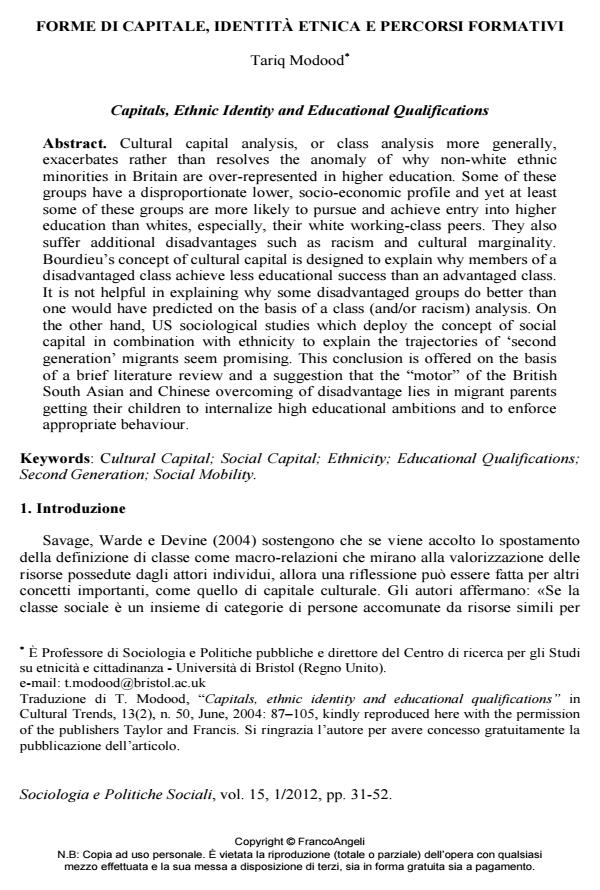Forme di capitale, identità etnica e percorsi formativi
Titolo Rivista SOCIOLOGIA E POLITICHE SOCIALI
Autori/Curatori Tariq Modood
Anno di pubblicazione 2012 Fascicolo 2012/1 Lingua Italiano
Numero pagine 22 P. 31-52 Dimensione file 441 KB
DOI 10.3280/SP2012-001003
Il DOI è il codice a barre della proprietà intellettuale: per saperne di più
clicca qui
Qui sotto puoi vedere in anteprima la prima pagina di questo articolo.
Se questo articolo ti interessa, lo puoi acquistare (e scaricare in formato pdf) seguendo le facili indicazioni per acquistare il download credit. Acquista Download Credits per scaricare questo Articolo in formato PDF

FrancoAngeli è membro della Publishers International Linking Association, Inc (PILA)associazione indipendente e non profit per facilitare (attraverso i servizi tecnologici implementati da CrossRef.org) l’accesso degli studiosi ai contenuti digitali nelle pubblicazioni professionali e scientifiche
Cultural capital analysis, or class analysis more generally, exacerbates rather than resolves the anomaly of why non-white ethnic minorities in Britain are over-represented in higher education. Some of these groups have a disproportionate lower, socio-economic profile and yet at least some of these groups are more likely to pursue and achieve entry into higher education than whites, especially, their white working-class peers. They also suffer additional disadvantages such as racism and cultural marginality. Bourdieu’s concept of cultural capital is designed to explain why members of a disadvantaged class achieve less educational success than an advantaged class. It is not helpful in explaining why some disadvantaged groups do better than one would have predicted on the basis of a class (and/or racism) analysis. On the other hand, US sociological studies which deploy the concept of social capital in combination with ethnicity to explain the trajectories of ‘second generation’ migrants seem promising. This conclusion is offered on the basis of a brief literature review and a suggestion that the "motor" of the British South Asian and Chinese overcoming of disadvantage lies in migrant parents getting their children to internalize high educational ambitions and to enforce appropriate behaviour.;
Keywords:Cultural Capital; Social Capital; Ethnicity; Educational Qualifications; Second Generation; Social Mobility.
Tariq Modood, Forme di capitale, identità etnica e percorsi formativi in "SOCIOLOGIA E POLITICHE SOCIALI" 1/2012, pp 31-52, DOI: 10.3280/SP2012-001003